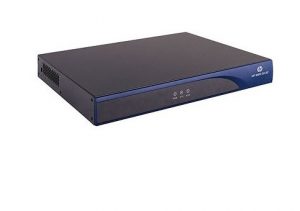HP A-MSR20-20 (JF283A)
 The HP MSR20 router series is a component of the HP FlexBranch solution, which is part of the HP FlexNetwork architecture. It features a modular design that delivers unmatched flexibility for small branch offices and small to medium-sized businesses while reducing complexity, simplifying management, and increasing control. MSR20 series routers provide a full-featured, resilient routing platform, including IPv6 and MPLS, up to 180 Kpps forwarding capacity, and 100 Mbps encryption. These products offer lasting investment protection, and help reduce capital and operating expenses. MSR20 series routers provide an agile, flexible network infrastructure that offers the ability to quickly adapt to changing business requirements while delivering integrated, concurrent services on a single, easy-to-manage platform.
The HP MSR20 router series is a component of the HP FlexBranch solution, which is part of the HP FlexNetwork architecture. It features a modular design that delivers unmatched flexibility for small branch offices and small to medium-sized businesses while reducing complexity, simplifying management, and increasing control. MSR20 series routers provide a full-featured, resilient routing platform, including IPv6 and MPLS, up to 180 Kpps forwarding capacity, and 100 Mbps encryption. These products offer lasting investment protection, and help reduce capital and operating expenses. MSR20 series routers provide an agile, flexible network infrastructure that offers the ability to quickly adapt to changing business requirements while delivering integrated, concurrent services on a single, easy-to-manage platform.
Quality of Service (QoS).
Traffic policing: supports Committed Access Rate (CAR) and line rate. Congestion management: supports FIFO, PQ, CQ, WFQ, CBQ, and RTPQ. Congestion avoidance: Weighted Random Early Detection (WRED)/Random Early Detection (RED). Other QoS technologies: support traffic shaping, FR QoS, MPLS QoS, and MP QoS/LFI.
Management.
Industry-standard CLI with a hierarchical structure: reduces training time and expenses, and increases productivity in multivendor installations. Management security: multiple privilege levels with password protection restrict access to critical configuration commands; ACLs provide telnet and SNMP access; local and remote syslog capabilities allow logging of all access. SNMPv1, v2, and v3: provide complete support of SNMP; provide full support of industry-standard Management Information Base (MIB) plus private extensions; SNMPv3 supports increased security using encryption. Remote monitoring (RMON): uses standard SNMP to monitor essential network functions; supports events, alarm, history, and statistics group plus a private alarm extension group. FTP, TFTP, and SFTP support: FTP allows bidirectional transfers over a TCP/IP network and is used for configuration updates; Trivial FTP is a simpler method using User Datagram Protocol (UDP).
Connectivity.
High-density port connectivity: provides up to 4 interface module slots and up to 18 Fast Ethernet ports. Multiple WAN interfaces: provide a traditional link with E1, T1, ADSL, ADSL2, ADSL2+, G.SHDSL, ATM, Serial, and ISDN/AM backup; provide high-density Ethernet access with WAN Fast Ethernet/Gigabit Ethernet and LAN 4- and 9-port Fast Ethernet; provide mobility access with 802.11b/g/n Wi-Fi and 3G. Packet storm protection: protects against broadcast, multicast, or unicast storms with user-defined thresholds. Loopback: supports internal loopback testing for maintenance purposes and an increase in availability; loopback detection protects against incorrect cabling or network configurations and can be enabled on a per-port or per-VLAN basis for added flexibility. Flexible port selection: provides a combination of fiber and copper interface modules, 100/1000BASE-X auto-speed selection, and 10/100/1000BASE-T auto-speed detection plus auto duplex and MDI/MDI-X.
Performance.
Powerful encryption capacity: includes embedded hardware encryption accelerator to improve encryption performance. Flexible chassis selection: offers a choice of three routers, meeting different requirements on enterprise branches. Excellent forwarding performance: provides forwarding performance up to 180 Kpps; meets current and future bandwidth-intensive application demands of enterprise businesses.
Backup Center: acts as a part of the management and backup function to provide backup for device interfaces; delivers reliability by switching traffic over to a backup interface when the primary one fails. Virtual Router Redundancy Protocol (VRRP): allows groups of two routers to dynamically back each other up to create highly available routed environments; supports VRRP load balancing.
Spanning Tree Protocol (STP): fully supports standard IEEE 802.1D STP, IEEE 802.1w Rapid Spanning Tree Protocol (RSTP) for faster convergence, and IEEE 802.1s Multiple Spanning Tree Protocol (MSTP). Internet Group Management Protocol (IGMP) and Multicast Listener Discovery (MLD) protocol snooping: effectively control and manage the flooding of multicast packets in a Layer 2 network. Port mirroring: duplicates port traffic (ingress and egress) to a local or remote monitoring port. VLANs: support up to 4,094 ports or IEEE 802.1Q-based VLANs. sFlow: allows traffic sampling.
Address Resolution Protocol (ARP): determines the MAC address of another IP host in the same subnet; supports static ARPs; gratuitous ARP allows detection of duplicate IP addresses; proxy ARP allows normal ARP operation between subnets or when subnets are separated by a Layer 2 network. User Datagram Protocol (UDP) helper: redirects UDP broadcasts to specific IP subnets to prevent server spoofing. Dynamic Host Configuration Protocol (DHCP): simplifies the management of large IP networks and supports client and server; DHCP Relay enables DHCP operation across subnets.
Specifications HP A-MSR20-20 (JF283A)
|
Antarmuka / Interface |
WAN: 2 SIC slots; 2 RJ-45 auto-sensing 10/100 WAN ports(IEEE 802.3 Type 10Base-T, IEEE 802.3u Type 100Base-TX), Duplex: half or full |
|
Encryption |
IKE, IPSec, Encryption accelerator, Portal |
|
Dimensi |
287.1 x 44.2 x 360 mm (WxHxD) |
|
Berat |
3 kg |
|
Lain-lain |
Traffic policing: supports Committed Access Rate (CAR) and line rate Congestion management: supports FIFO, PQ, CQ, WFQ, CBQ, and RTPQ Congestion avoidance: weighted Random Early Detection (WRED)/RED Other QoS technologies: support traffic shaping, FR QoS, MPLS QoS, and MP Industry-standard CLI with a hierarchical structure: reduces training time and expenses, and increases productivity in multivendor installations Management security: multiple privilege levels, with password protection, restrict access to critical configuration commands; ACLs provide telnet and SNMP access; local and remote syslog capability allow logging of all access SNMPv1, v2, and v3: provide complete support of SNMP; SNMPv3 supports increased security using encryption; provide full support of industry-standard MIBs plus private MIB extensions Remote monitoring (RMON): uses standard SNMP to monitor essential network functions; supports events, alarm, history, and statistics group plus a private alarm extension group FTP, TFTP, and SFTP support: File Transfer Protocol allows bi-directional transfers over a TCP/IP network and is used for configuration updates; Trivial FTP is a simpler method using UDP 3G access support: allows use of SIC 3G module for high reliability; supports popular USB 3G modem High-density port connectivity: provides up to 4 interface module slots and up to 18 Fast Ethernet ports Multiple WAN interfaces: provide a traditional link with Serial, E1/T1, ADSL, and ISDN/AM backup; provide high-density Ethernet access with WAN Fast Ethernet/Gigabit Ethernet and LAN 4- and 9-port Fast Ethernet; provide mobility access with 11g/n Wi-Fi and 3G Packet storm protection: protects against broadcast, multicast, or unicast storms with user-defined thresholds Loopback: supports internal loopback testing for maintenance purposes and an increase in availability; loopback detection protects against incorrect cabling or Powerful encryption capacity: includes embedded hardware encryption accelerator to improve encryption performance Flexible chassis selection: offers a choice of three routers, meeting different requirements on enterprise branches Excellent forwarding performance: provides forwarding performance up to 180 Kpps; meets today’s and future bandwidth-intensive application demands for enterprise businesses |




